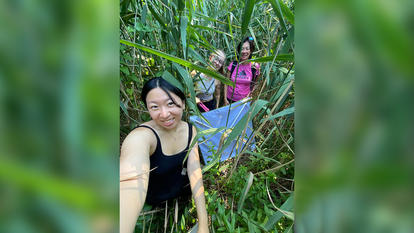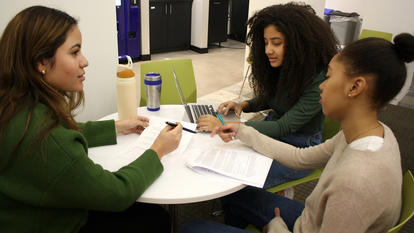
Sociology Professor Smitha Radhakrishnan Is Keeping Busy During the Pandemic
Smitha Radhakrishnan had ambitious plans for the summer of 2020. In July, she was going to travel with her spouse and two young children to India for a month to work on a new sociological research project.
“We were all going to go to India and spend about a month traveling to five different places, which was going to be totally crazy, but we were just going to do it,” said Radhakrishnan, Luella LaMer Professor of Women’s Studies and professor of sociology at Wellesley. Afterward, they were planning to travel to Amsterdam, where she was scheduled to present two papers at the annual conference of the Society for the Advancement of Socio-Economics.
As the coronavirus spread across the world and travel became increasingly difficult, if not impossible, those plans were canceled. Instead, Radhakrishnan found herself calling in to the conference via video link from her attic in Natick, Mass.
“That’s our office space now,” Radhakrishnan said. “Although I sometimes work in our bedroom, because all my family members are on calls at the same time, so we have to find different areas.”
Being constrained to Natick in near-constant competition with her spouse and children for a quiet space to work was not how Radhakrishnan expected to spend her summer, but it hasn’t made her slow her pace. She has been using the time at home to make headway on three separate book projects.
Radhakrishnan and Cinzia Solari, an associate professor of sociology at UMass Boston with whom she has been collaborating since graduate school, are writing a book on gender, nation, and neoliberalism that brings together literature on migration, development, and nationalism. “The whole book is about how reproductive labor, which is still carried out mostly by women, and the unpaid labor of women undergirds and underwrites the entire capitalist economy,” Radhakrishnan said.
“How do you do sociology with South Asia at the center? What kinds of theories, politics, empirical perspectives, or historical perspectives emerge from putting South Asia at the center? That’s what we are hoping to answer.”
Smitha Radhakrishnan, Luella LaMer Professor of Women’s Studies and professor of sociology
In addition, she and Gowri Vijayakumar, assistant professor of sociology at Brandeis, are editing a volume that charts new territory in the sociology of South Asia. “Sociology has been a notoriously American-centered field,” Radhakrishnan said, “but I think [it] is having a real moment of reckoning in terms of realizing its racism and colonialism and the ways that it’s tied up in all these different projects of white supremacy.”
The collection represents the work of scholars who study South Asia and are engaged in empirical and theoretical research based on the subcontinent. “What does it look like if you center South Asia? How do you do sociology with South Asia at the center? What kinds of theories, politics, empirical perspectives, or historical perspectives emerge from putting South Asia at the center?” Radhakrishnan said. “That’s what we are hoping to answer.”
Radhakrishnan is also wrapping up edits on her second book, on commercial microfinance in India, which she began researching in 2011.
“A lot of people are familiar with this idea of giving small loans to impoverished women to help them start businesses that help pull them out of poverty,” Radhakrishnan said. “It’s been popularized on websites like Kiva.org, where you can supposedly give a peer-to-peer loan to a woman in the global south, and then she’d repay you, and everyone would feel good about it.”
The reality, Radhakrishnan says, is a lot more complicated, especially in India, the focus of her research.
“In India, since about the late 1990s, what you have is a saturation of financial products geared toward women, some of which are run through the state, have low interest rates, and are run by the women themselves,” Radhakrishnan said. But India, she added, is the most unbanked country in the world, a legacy of colonialism. “Post-colonial India has been pretty ineffective in getting basic fair banking services to the masses,” Radhakrishnan said. “Since the late 1990s and early 2000s, the policy environment has really encouraged private companies to fill this gap.”
Radhakrishnan’s work focuses on the for-profit microfinance companies that have filled the gap, particularly in urban areas, which are currently understudied. She examines entrepreneurial training programs and financial literacy programs, the people who design and run them, and the women who attend them.
She has spoken with many women who accepted loans about the type and origin of the loans, what they did with the money they borrowed, and whether they found the training sessions useful. She has also examined lending institutions and their operations, and participated in the training side by spending time with field workers, loan verification officers, and others to understand the day-to-day process of collecting and disbursing loans to low-income Indians.
“When I started, I thought the project was just going to be about the interactions between the organizations and the clients,” she said, “but it ended up being an analysis where I look at how these companies really extract value from gendered labor, and the way they actually recover loans with very high interest rates from people who don’t have the means to pay them. It looks like they are giving money to women, but in fact they are extracting value from the bottom up.”
This fall at Wellesley, Radhakrishnan is looking forward to chairing the Commission on Ethnicity, Race, and Equity (CERE), and she has been following the recent student activism at the College with interest. “I’ve been really excited by the activism of Black students to get us to really rethink the curriculum,” Radhakrishnan said. “I’m a direct advisor to President Johnson on issues of race and ethnicity. We’ve discussed many of the issues that Black students have recently raised, and I think that we’re at a moment where there’s possibility for real change.”
Radhakrishnan is also excited about potential changes to the College’s academic programs. “I feel like right now, with this COVID crisis, all of our faculty members are rethinking how to teach, and what we teach, and my hope is that will be part of a larger project of equity and inclusion,” she said. “I’m really hoping that an overhaul of the curriculum and some real changes in terms of how we do business as usual at Wellesley are afoot for the fall and the spring.”


